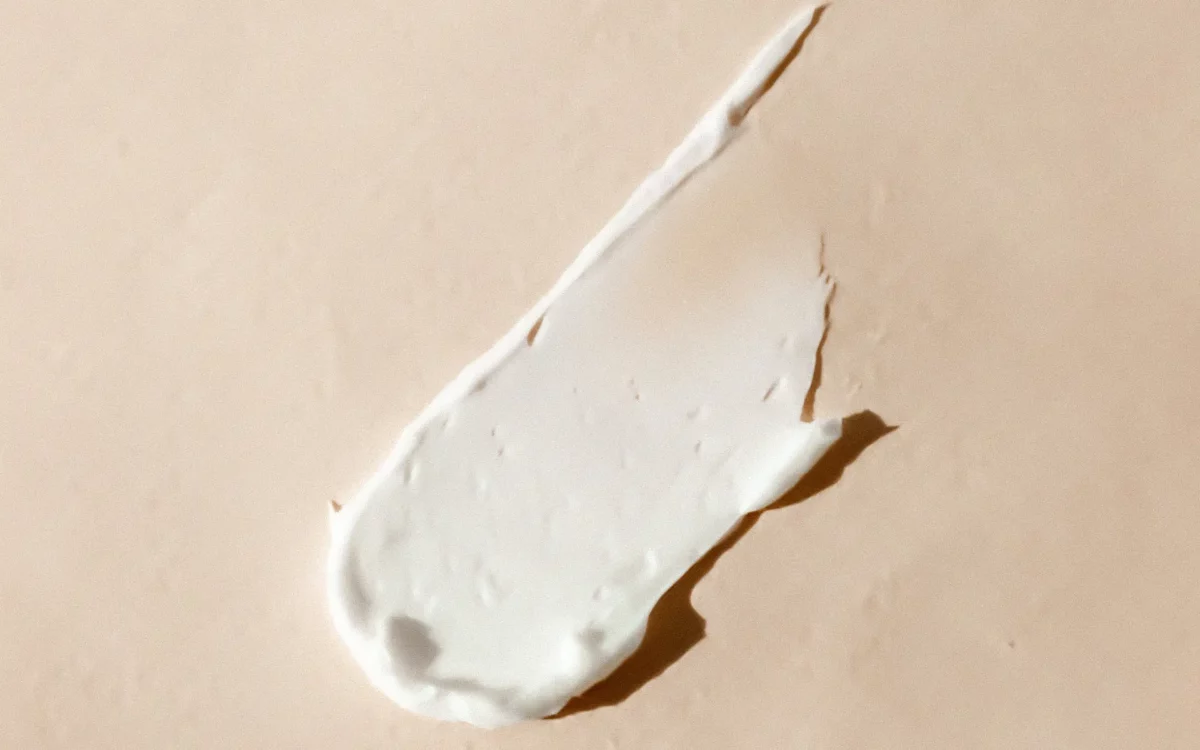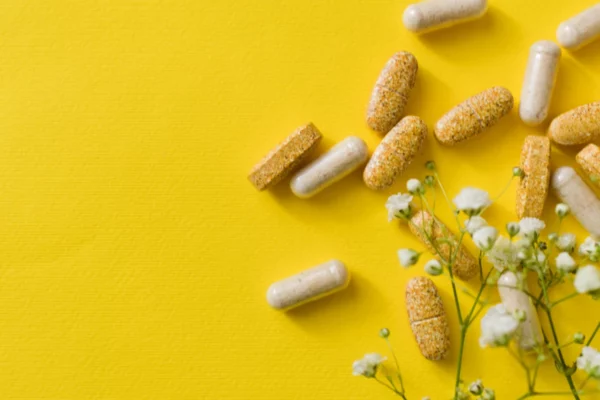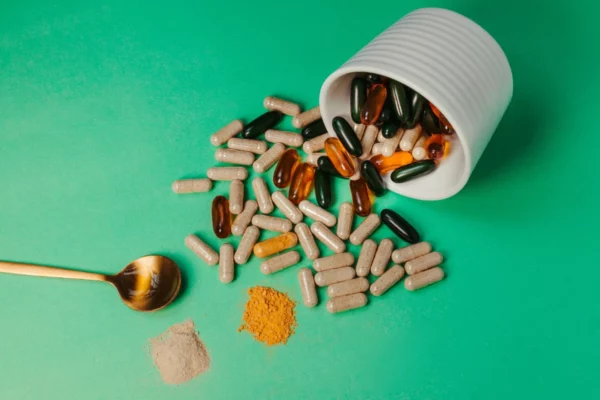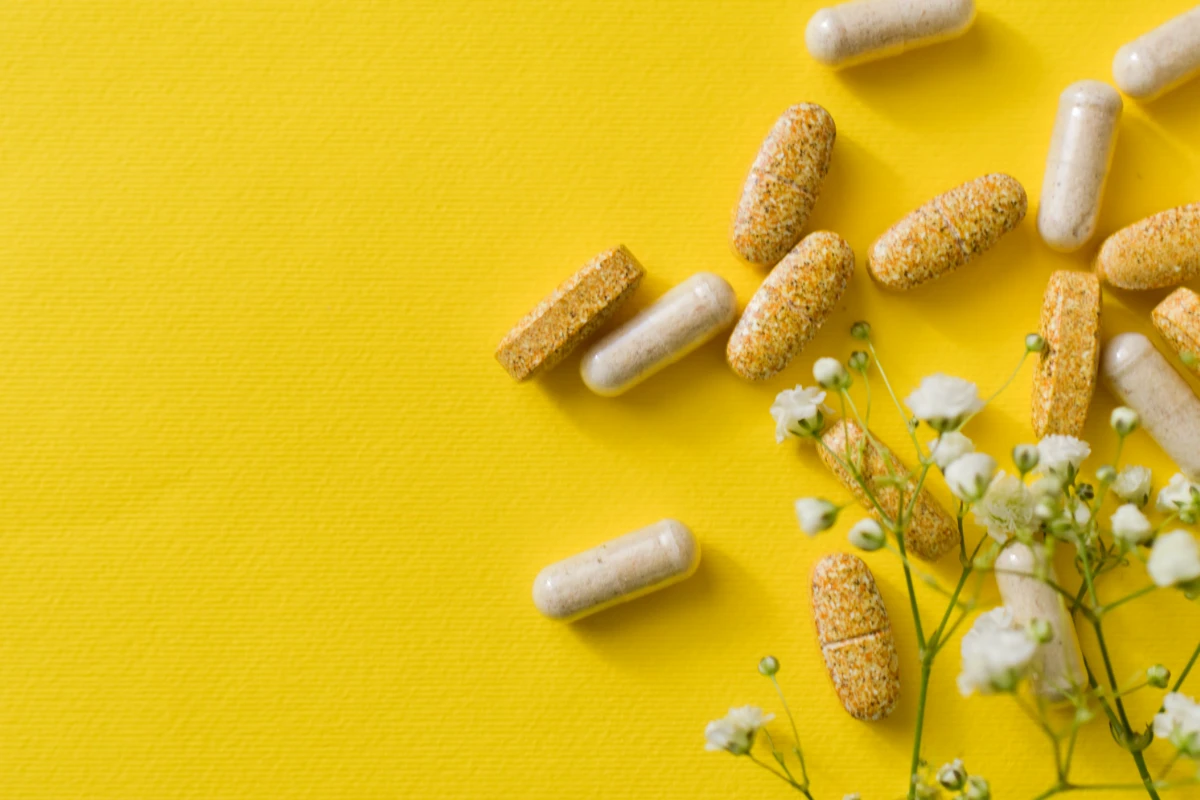Our skin is the largest organ in the human body and plays an important role in our overall health and appearance. Many people focus on skincare products and topical treatments to achieve clear and radiant skin, but the truth is that what we put into our bodies is just as important as what we apply on the outside. Incorporating the right foods into your diet can have a significant impact on skin health, and one key nutrient that shouldn’t be overlooked is dietary fiber.
The Link Between Fiber and Healthy Skin
Dietary fiber is a type of carbohydrate that is found in plant foods such as fruits, vegetables, whole grains, legumes, and nuts. It is known for its ability to promote digestion and regulate bowel movements, but its benefits go beyond just gastrointestinal health. Fiber is also crucial for maintaining healthy skin.
1. Nutrient Absorption
A high-fiber diet allows for better absorption of essential nutrients that are important for skin health, such as vitamins, minerals, and antioxidants. For example, vitamin C found in citrus fruits and vitamin E found in sunflower seeds are powerful antioxidants that protect the skin from damage caused by harmful UV rays and environmental pollutants. By consuming fiber-rich foods, you can ensure that your body absorbs these nutrients efficiently for optimal skin health.
2. Balancing Hormones
Hormonal imbalance can contribute to various skin issues, including acne and hair loss. Fiber helps regulate hormone levels by preventing spikes and crashes in blood sugar levels. When we consume foods high in fiber, such as sweet potatoes, and whole grains like brown rice, our blood sugar levels remain stable, thus reducing the risk of hormonal imbalances that can negatively affect the skin and hair.
3. Detoxification and Clear Skin
A fiber-rich diet supports the body’s natural detoxification processes, helping to flush out toxins and waste that can cause skin problems like acne and dullness. Fiber acts like a sponge, absorbing toxins and promoting regular bowel movements to eliminate them from the body. Including foods like chia seeds and flax seeds, which are rich in fiber, can aid in detoxification and promote clear, glowing skin.
4. Anti-Inflammatory Effects
Inflammation is a common underlying factor in many skin conditions, including acne, eczema, and psoriasis. Fiber has anti-inflammatory properties that help reduce inflammation throughout the body, including the skin. Incorporating foods like dark leafy greens and red peppers, which are high in fiber, can help combat inflammation and promote healthier skin.
5. Weight Management
Maintaining a healthy weight is important not only for overall health but also for skin health. Excess weight and obesity have been linked to various skin problems, including acne and dark spots. Fiber-rich foods are known to keep you feeling full for longer, reducing the chances of overeating and aiding in weight loss or weight management. Adding fiber-containing foods like oats and oatmeal, as well as legumes and whole grains like quinoa, to your diet can support a healthy weight and promote better skin health.
Incorporating Fiber into Your Diet
Now that you understand the power of dietary fiber for healthy skin, you may be wondering how to incorporate it into your daily diet. Here are some easy ways to increase your fiber intake:
1. Start your day with a high-fiber breakfast, such as overnight oats or a smoothie made with fruits, vegetables, and flax seeds.
2. Choose whole grains like quinoa, brown rice, and whole grain spelt as a healthier alternative to refined grains.
3. Snack on fiber-rich foods like nuts, seeds, and fresh fruits.
4. Include plenty of vegetables in your meals, especially dark leafy greens like spinach and kale.
5. Opt for legumes like beans, lentils, and chickpeas as a source of fiber and plant-based protein.
6. Stay hydrated by drinking plenty of water and consuming fiber-containing beverages like coffee and herbal teas.
Remember, it’s important to gradually increase your fiber intake and drink enough water to prevent any digestive discomfort. If you find it challenging to incorporate enough fiber into your diet, you can also consider fiber supplements as a convenient option to meet your daily fiber needs.
In addition to incorporating fiber-rich foods into your diet, there are other dietary considerations that can enhance the health and appearance of your skin.
Let’s explore some of the best foods for healthy skin:
1. Beta Carotene-Rich Foods
Beta carotene is a powerful antioxidant that converts into vitamin A in the body. It helps protect the skin from sun damage, promotes cell turnover, and contributes to a natural glow. Foods such as carrots, sweet potatoes, and dark leafy greens like spinach and kale are rich in beta-carotene and should be included in your diet for healthy, radiant skin.
2. Foods High in Omega-3 Fatty Acids
Omega-3 fatty acids are essential fats that are known for their anti-inflammatory properties and ability to nourish the skin. They help to maintain the health of cell membranes, promote moisture retention, and reduce the appearance of wrinkles and fine lines. Include foods like fatty fish (salmon, mackerel, sardines), chia seeds, flax seeds, and walnuts in your diet to reap the benefits of omega-3 fatty acids for your skin.
3. Vitamin C-Rich Foods
Vitamin C is essential for collagen production, which is vital for maintaining the elasticity and firmness of the skin. Citrus fruits like oranges, lemons, and grapefruits, as well as berries like strawberries and blueberries, are excellent sources of vitamin C. Including these fruits in your diet can promote healthy and youthful-looking skin.
4. Foods Rich in Vitamin E
Vitamin E is a powerful antioxidant that protects the skin from free radical damage and helps to maintain its natural moisture. Nuts, seeds (such as sunflower seeds), and avocado are rich sources of vitamin E and can be included in your diet for healthy skin.
5. Foods High in Zinc
Zinc is an important mineral for skin health, as it plays a role in healing wounds, reducing inflammation, and regulating oil production. Foods like oysters, red meat, pumpkin seeds, and legumes are excellent sources of zinc and can help promote healthier skin.
6. Hydration with Water and Healthy Beverages
Drinking an adequate amount of water is crucial for maintaining proper hydration, which is essential for healthy skin. Additionally, consuming fiber-containing beverages like coffee, herbal teas, and high-fiber smoothies can contribute to your overall hydration and provide additional skin-boosting benefits.
7. Incorporating Other Essential Nutrients
Apart from fiber, there are other essential nutrients that contribute to healthy skin. For example, vitamin D, which can be obtained from sunlight exposure, and certain foods, like fatty fish, play a role in skin cell growth and repair. Vitamin K, found in dark leafy greens like kale and spinach, can help reduce the appearance of dark spots and under-eye circles.
What is the role of dietary fiber in maintaining healthy skin?
Dietary fiber plays a crucial role in maintaining healthy skin. Here are 10 key reasons why:
- Promotes regular bowel movements: Fiber adds bulk to your stool, preventing constipation and ensuring regular elimination. This cleansing effect helps to remove toxins from your body, which can indirectly benefit your skin by reducing the risk of acne and breakouts.
- Supports digestive health: A healthy digestive system is essential for optimal nutrient absorption. When your body efficiently absorbs nutrients from your diet, it can provide the building blocks necessary for healthy skin cells and a radiant complexion.
- Controls blood sugar levels: A diet high in refined carbohydrates can lead to spikes in blood sugar levels, causing inflammation and potentially worsening skin conditions like acne and rosacea. Fiber slows down the release of glucose into the bloodstream, helping to maintain stable blood sugar levels and reduce skin-related issues.
- Reduces inflammation: Chronic inflammation can trigger various skin conditions, including psoriasis, eczema, and acne. Fiber-rich foods, such as fruits, vegetables, and whole grains, contain anti-inflammatory properties that can help calm the skin and reduce redness.
- Provides antioxidant protection: Certain types of dietary fiber, such as beta-glucans, have antioxidant effects. Antioxidants help combat free radicals, which are unstable molecules that can damage skin cells and contribute to premature aging.
- Maintains a healthy gut microbiome: Fiber acts as a prebiotic, nourishing the beneficial bacteria in your gut. A balanced and diverse gut microbiome is linked to better skin health, as these friendly bacteria support immune function and enhance nutrient absorption.
- Aids in weight management: Fiber-rich foods are typically filling and can help control appetite, preventing overeating and weight gain. Maintaining a healthy weight is important for overall skin health, as excessive body fat can lead to hormonal imbalances and skin issues.
- Supports collagen production: Collagen is a vital protein responsible for the structure and elasticity of the skin. Some types of fiber, such as vitamin C-rich fruits and vegetables, play a role in collagen synthesis, promoting firmness and youthfulness in the skin.
- Increases hydration: Certain soluble fibers, like glucomannan, have the ability to absorb water and form a gel-like substance. When consumed with an adequate amount of fluids, these fibers can contribute to overall hydration, keeping your skin moisturized and supple.
- Boosts overall nutrient intake: Fiber-rich foods are often nutrient-dense, meaning they provide essential vitamins, minerals, and antioxidants necessary for healthy skin. By incorporating a variety of fiber sources in your diet, you can optimize your nutrient intake and support your skin’s health.
How can proper nutrition benefit the skin?
Proper nutrition plays a significant role in promoting healthy skin. Here are 10 ways in which it benefits your skin:
- Provides essential nutrients: A well-balanced diet rich in fruits, vegetables, lean proteins, whole grains, and healthy fats ensures that your skin receives a wide range of vitamins, minerals, and antioxidants necessary for its health and function.
- Promotes collagen production: Collagen is a vital protein that gives skin its structure and elasticity. Consuming foods containing amino acids, such as proline and lysine, helps support collagen synthesis, promoting firmness and reducing wrinkles.
- Enhances wound healing: Nutrients like vitamin C, vitamin E, zinc, and protein are essential for proper wound healing. Adequate intake of these nutrients promotes the formation of new skin tissue and accelerates the healing process.
- Reduces oxidative stress: Antioxidant-rich foods, such as berries, leafy greens, and nuts, help combat oxidative stress caused by exposure to environmental pollutants and UV radiation. This reduces the risk of premature aging and promotes a healthy, youthful complexion.
- Supports skin hydration: Hydrated skin appears plump, glowing, and healthy. Drinking an adequate amount of water and consuming hydrating foods, such as fruits and vegetables, helps maintain optimal skin hydration and prevent dryness.
- Reduces inflammation: Chronic inflammation is associated with various skin conditions, such as acne, eczema, and psoriasis. A diet rich in anti-inflammatory foods, such as fatty fish, turmeric, and olive oil, helps reduce inflammation and minimize skin issues.
- Protects against sun damage: Antioxidant-rich foods, particularly those containing carotenoids and polyphenols, help protect the skin from UV-induced damage. Consuming foods like tomatoes, carrots, green tea, and dark chocolate can provide natural sun protection.
- Maintains healthy oil production: Essential fatty acids, like omega-3 and omega-6, play a crucial role in maintaining the skin’s natural oil barrier. Incorporating foods like salmon, avocado, flaxseeds, and nuts can promote balanced oil production and prevent dry or oily skin.
- Supports a healthy gut: A properly functioning gut is essential for optimal nutrient absorption. Poor gut health can lead to skin issues like acne and inflammation. Including fiber-rich foods and probiotics in your diet supports a healthy gut microbiome, which can positively impact your skin.
- Prevents nutrient deficiencies: Inadequate intake of specific nutrients, such as vitamin C, vitamin E, zinc, and selenium, can contribute to skin problems. Consuming a varied and nutrient-dense diet helps prevent deficiencies and supports healthy skin.
Does fiber intake affect skin health?
Absolutely! Fiber intake can significantly impact skin health. Here are 10 ways in which fiber affects your skin:
- Promotes regular bowel movements: Consuming an adequate amount of fiber ensures regular bowel movements, preventing constipation. When waste products are effectively eliminated from the body, toxins are removed, reducing the risk of skin issues.
- Supports detoxification: Fiber acts as a natural detoxifier, binding to toxins, and escorting them out of the body. This detoxification process can help reduce the burden on the liver and improve skin clarity.
- Reduces the risk of acne: Fiber-rich diets have been associated with a lower risk of acne. This may be due to the fact that high-fiber foods help regulate blood sugar levels, which can promote a clearer complexion.
- Prevents skin inflammation: Several types of fiber, such as beta-glucans and resveratrol, have anti-inflammatory properties. Including foods like oats, barley, flaxseeds, and grapes in your diet can help reduce skin inflammation and redness.
- Enhances nutrient absorption: Fiber helps optimize nutrient absorption in the gut. When your body properly absorbs essential vitamins and minerals from your diet, it can support skin health by providing the necessary building blocks for vibrant and glowing skin.
- Supports healthy gut bacteria: Fiber acts as a prebiotic, providing nourishment to beneficial gut bacteria. A balanced gut microbiome contributes to improved digestion, overall health, and could potentially reduce the risk of skin conditions.
- Promotes weight management: High-fiber foods are typically more filling and can help control appetite. This can support weight management, as excessive body weight is associated with increased inflammation and skin disorders.
- Helps prevent premature aging: Fiber contains antioxidants that protect against free radicals, which contribute to premature aging. By including fiber-rich foods in your diet, you can help keep your skin youthful and slow down the aging process.
- Increases skin hydration: Certain types of soluble fiber can absorb water and retain it in the colon, contributing to overall hydration. Well-hydrated skin is plump and healthy, reducing the appearance of fine lines and wrinkles.
- Improves overall skin appearance: When your body is properly nourished with fiber, it can support optimal skin health, leading to improved skin texture, reduced inflammation, and a vibrant complexion.
How does proper hydration impact skin health?
Proper hydration is crucial for maintaining healthy skin. Here’s why:
- Increases skin moisture: Water is the essential component of healthy, moisturized skin. When your body is properly hydrated, your skin appears plump and more resilient, reducing the appearance of fine lines and wrinkles.
- Facilitates nutrient delivery: Water acts as a transportation system, delivering essential nutrients to skin cells. Proper hydration supports this process, ensuring that important vitamins, minerals, and antioxidants reach the skin where they are needed most.
- Flushes out toxins: Adequate hydration helps to flush out toxins and waste products from the body. This can prevent the buildup of toxins that can contribute to skin issues such as acne and dullness.
- Maintains skin elasticity: When your skin is properly hydrated, it maintains its elasticity and firmness. This can help prevent sagging and maintain a more youthful appearance.
- Improves skin tone and texture: Dehydrated skin can appear dull, rough, and uneven. Drinking enough water and staying properly hydrated can help improve your skin’s texture and promote a more radiant complexion.
- Aids in the regulation of body temperature: Proper hydration is crucial for regulating body temperature. When your body is overheated, it releases sweat to cool down. Sweat contains water, and when adequately hydrated, the body can replenish this water loss, helping to maintain optimal body temperature and prevent skin issues associated with heat.
- Prevents dryness and flakiness: Dehydration can lead to dry, flaky skin. By ensuring proper hydration, you can help maintain the skin’s natural moisture barrier and prevent dryness and irritation.
- Reduces the risk of skin disorders: Certain skin conditions, such as eczema and psoriasis, can be aggravated by dehydration. By drinking enough water, you can help reduce the risk of these disorders and promote healthier skin.
- Aids in the healing process: Proper hydration is essential for wound healing. When your body is well-hydrated, it can support the formation of new cells and tissues, facilitating the healing process for cuts, scrapes, or other skin injuries.
- Supports a healthy complexion: Overall, proper hydration supports a healthy complexion. When your skin is hydrated, it appears brighter, more supple, and less prone to blemishes and irritation.
- Helps with skin detoxification: Water plays a vital role in the body’s detoxification processes. It helps flush out waste materials, allowing the body to eliminate toxins that can negatively impact the skin.
How does nutrition affect the aging process of the skin?
Nutrition has a significant impact on the aging process of the skin. Here’s how:
- Collagen production and maintenance: Nutrients such as vitamin C, vitamin E, and amino acids (proline and lysine) are vital for collagen synthesis. Collagen is responsible for maintaining the skin’s structural integrity and elasticity. Inadequate nutrition can lead to a decrease in collagen production, resulting in sagging and wrinkles.
- Protection against oxidative stress: Antioxidants found in fruits, vegetables, and other plant-based foods help neutralize free radicals, which are unstable molecules that contribute to cellular damage. Adequate intake of antioxidants can help protect the skin from premature aging caused by oxidative stress.
- Hydration and moisturization: Proper hydration and a diet rich in water-rich foods can help maintain optimal moisture levels in the skin. This can reduce the appearance of fine lines and wrinkles and promote a more youthful complexion.
- Reduction of inflammation: Chronic inflammation can contribute to skin aging. A diet high in inflammatory foods, such as processed sugars and unhealthy fats, can accelerate the aging process. On the other hand, consuming an anti-inflammatory diet rich in fruits, vegetables, whole grains, and healthy fats can help reduce inflammation and slow down skin aging.
- Essential fatty acids: Omega-3 and omega-6 fatty acids play a crucial role in maintaining the skin’s barrier function. Adequate intake of these healthy fats supports the skin’s ability to retain moisture, reduce inflammation, and promote a smooth and youthful appearance.
- Reduced glycation: Glycation is a process that occurs when excess sugar molecules bind to collagen fibers, resulting in the formation of advanced glycation end products (AGEs). AGEs can lead to the breakdown of collagen, causing wrinkles and other signs of aging. By reducing sugar intake, you can minimize glycation and slow down the aging process.
- Protein synthesis: Adequate protein intake is necessary for the synthesis of collagen and other proteins. Consuming a sufficient amount of high-quality proteins, such as lean meats, fish, legumes, and dairy products, can support skin health and delay the signs of aging.
- Micronutrient support: Essential vitamins and minerals, such as vitamins A, C, and E, zinc, and selenium, play a crucial role in maintaining healthy skin and combating cellular damage. A balanced and diverse diet can ensure that your skin receives the necessary micronutrients for optimal functioning.
- Overall good health: Maintaining good overall health through proper nutrition can indirectly support skin health and slow down the aging process. A healthy diet can help maintain a strong immune system, regulate hormonal balance, and support organ function, all of which contribute to healthy and youthful-looking skin.
- Sun protection: Certain foods, such as tomatoes, green tea, and dark chocolate, contain natural compounds that provide some degree of sun protection. Incorporating these foods into your diet, alongside proper sun protection measures, can help reduce sun damage and minimize the signs of aging caused by UV radiation.
Does nutrition play a role in managing common skin conditions?
Yes, nutrition can play a significant role in managing various common skin conditions. Here’s how:
- Acne: Certain dietary factors, such as a high glycemic load diet (excessive sugar and refined carbohydrates) and dairy consumption, have been linked to acne. A diet rich in whole foods, fruits, vegetables, and lean proteins while minimizing processed foods and sugar can contribute to clearer skin.
- Eczema: Eczema, or atopic dermatitis, is often associated with food allergies or sensitivities. Identifying and eliminating trigger foods, such as dairy, gluten, or certain nuts, may help manage eczema symptoms. Consuming anti-inflammatory foods and those rich in omega-3 fatty acids, like fatty fish and flaxseeds, may also provide relief.
- Rosacea: Rosacea is a chronic skin condition characterized by facial redness and flushing. Spicy foods, alcohol, and hot beverages are known triggers for many individuals with rosacea. Avoiding these triggers and incorporating anti-inflammatory foods can help manage symptoms.
- Psoriasis: Psoriasis is an autoimmune skin condition characterized by inflamed, scaly patches. While diet alone cannot cure psoriasis, certain dietary modifications may help manage symptoms. Including anti-inflammatory foods, maintaining a healthy weight, and avoiding trigger foods like alcohol and refined sugars may provide relief.
- Dry skin: Dry skin can benefit from a diet rich in healthy fats and hydration. Consuming foods like avocados, olive oil, fatty fish, and drinking sufficient water can support the skin’s moisture barrier and improve dryness.
- Hyperpigmentation: Hyperpigmentation is the darkening of the skin due to increased melanin production. Consuming foods rich in antioxidants, such as berries and leafy greens, can help combat oxidative stress and promote more even skin tone.
- Wrinkles: Wrinkles can occur with age and are influenced by both genetic and environmental factors. However, a diet rich in antioxidants, collagen-building nutrients, and proper hydration can help minimize the appearance of wrinkles and promote smoother, more youthful-looking skin.
- Oily skin: Oily skin can be managed by consuming a balanced diet that includes a variety of fruits, vegetables, whole grains, lean proteins, and healthy fats. Avoiding excess sugar, refined carbohydrates, and fried foods can help regulate oil production and minimize skin issues associated with oily skin, such as acne.
- Dark circles: Dark circles under the eyes can be influenced by various factors, including nutrient deficiencies and poor circulation. Consuming a nutritious diet rich in vitamins A, C, E, and K, along with sufficient hydration, can help improve the appearance of dark circles.
- Sensitive skin: Sensitive skin can react to certain foods, drugs, or environmental factors, resulting in redness, irritation, or inflammation. Identifying and eliminating trigger foods, such as spicy foods, alcohol, or highly processed foods, can help manage symptoms and support skin health.
Can certain foods cause skin allergies or irritations?
Yes, certain foods can cause skin allergies or irritations in susceptible individuals. Common food allergens include:
- Dairy products
- Nuts and peanuts
- Soy
- Wheat and gluten
- Eggs
- Shellfish
Skin reactions to these allergenic foods can include hives, eczema flare-ups, itching, swelling, or redness. It’s important to note that food allergies are individual-specific, and not everyone will have the same reactions to these foods. If you suspect a food allergy or intolerance, it is recommended to consult with a healthcare professional for proper diagnosis and guidance. In addition to food allergies, certain foods or ingredients may cause skin irritations in some individuals. These irritations can manifest as contact dermatitis or skin sensitivity. Common culprits include:
- Artificial additives and preservatives
- Food colorings
- Spices
- Highly acidic foods or beverages
- Hot and spicy foods
- Alcohol
- Processed or heavily refined foods
If you experience skin irritations or sensitivity after consuming specific foods, it may be helpful to keep a food diary and note any reactions. This can help identify potential triggers and allow you to avoid or limit your intake of these foods. It’s essential to remember that everyone’s body is unique, and what may be a trigger for one person may not affect another. If you suspect a food allergy or experience persistent skin irritations, it is recommended to consult with a healthcare professional or allergist for proper evaluation, testing, and guidance on managing your specific condition.
Can nutritional supplements improve skin health?
Nutritional supplements can play a beneficial role in improving skin health when used appropriately and in conjunction with a balanced diet. Here are a few key supplements that are commonly associated with supporting skin health:
- Omega-3 fatty acids: Omega-3 supplements, typically derived from fish oil, can provide essential fatty acids that support skin health by reducing inflammation, improving hydration, and promoting overall skin integrity.
- Collagen peptides: Collagen supplements, often in the form of hydrolyzed collagen peptides, can provide amino acids necessary for collagen production in the skin. They may help improve skin elasticity, reduce the appearance of wrinkles, and support overall skin health.
- Vitamin C: Vitamin C is a potent antioxidant that supports collagen synthesis and protects against oxidative damage. Supplementing with vitamin C can promote skin firmness, reduce hyperpigmentation, and support a healthy complexion.
- Vitamin E: Vitamin E is an antioxidant that helps protect the skin from oxidative stress caused by free radicals. It can enhance skin moisturization, improve elasticity, and reduce the appearance of scars or wrinkles.
- Zinc: Zinc is involved in various skin functions, including wound healing, regulation of sebum production, and maintaining the integrity of the skin barrier. Zinc supplements may help manage acne and promote overall skin health.
- Probiotics: Probiotic supplements can improve gut health and support a healthy gut microbiome. An imbalance in gut bacteria has been linked to skin issues, and by promoting a healthy gut, probiotics may indirectly improve skin health.
- Antioxidants: Antioxidant supplements, such as resveratrol or green tea extract, can provide additional protection against free radicals, reducing oxidative damage and supporting skin health.
- Biotin: Biotin, or vitamin B7, is essential for healthy skin, hair, and nails. Supplementing with biotin may promote the strength and appearance of the skin, particularly in individuals with biotin deficiency.
- Selenium: Selenium is an essential trace mineral that acts as an antioxidant, protecting against cellular damage. Supplementing with selenium may help improve skin elasticity and overall skin health.
- Hydrochloric acid and digestive enzymes: Improving digestion and nutrient absorption can indirectly benefit skin health. Supplements like hydrochloric acid and digestive enzymes may support better digestion and nutrient utilization.
While nutritional supplements can be beneficial, it’s important to remember that they should not replace a balanced diet. It’s always best to obtain nutrients primarily through food sources and use supplements to fill gaps when necessary. Consult with a healthcare professional or registered dietitian before starting any new supplements to ensure they are appropriate for your specific needs and health conditions.
How does stress affect the skin, and can nutrition help manage stress-related skin issues?
Stress can have a significant impact on the skin, contributing to various skin issues. Here’s how stress affects the skin and how nutrition can help manage stress-related skin problems:
- Acne and breakouts: Stress triggers the release of certain hormones, such as cortisol, which can lead to increased oil production and inflammation. This can contribute to acne and breakouts. Consuming a healthy diet rich in fruits, vegetables, whole grains, and lean proteins can support hormonal balance and reduce the severity of acne.
- Wrinkles and premature aging: Chronic stress accelerates the aging process by promoting the breakdown of collagen and elastin fibers responsible for skin elasticity. Antioxidant-rich foods, such as berries, leafy greens, and dark chocolate, can help combat oxidative stress caused by stress and minimize the signs of premature aging.
- Eczema and psoriasis flare-ups: Stress can trigger flare-ups in individuals with eczema and psoriasis. Consuming anti-inflammatory foods, such as fatty fish, turmeric, and green leafy vegetables, can help manage inflammation and minimize skin issues associated with these conditions.
- Dryness and dullness: Stress often disrupts the skin’s moisture barrier, leading to dryness and a dull complexion. Consuming water-rich foods, such as cucumbers, watermelon, and oranges, can help hydrate the skin from the inside out and promote a more vibrant appearance.
- Skin sensitivity and irritation: Stress can make the skin more reactive and prone to irritations. Consuming a nutrient-rich diet that includes vitamins A, C, and E, along with essential fatty acids, can help soothe and calm the skin, reducing sensitivity and irritation.
- Impaired wound healing: Stress impairs the body’s ability to heal wounds efficiently. Adequate intake of protein, vitamin C, and zinc can enhance wound healing and support the skin’s regenerative processes.
- General skin health: A balanced and nutritious diet is essential for overall skin health, including managing the impact of stress on the skin. Consuming a variety of whole foods rich in vitamins, minerals, antioxidants, and healthy fats can support the skin’s resilience, reduce inflammation, and maintain a healthy complexion.
While nutrition alone cannot eliminate stress, a healthy diet can provide the necessary nutrients to support the body’s stress response and mitigate the impact of stress on the skin. Additionally, incorporating stress management techniques like regular exercise, adequate sleep, mindfulness practices, and seeking support from professionals can further help manage stress-related skin issues.
Can dietary fiber improve gut health, and how does it relate to skin health?
Dietary fiber plays a crucial role in improving gut health and indirectly affects skin health through the gut-skin axis. Here’s how dietary fiber improves gut health and its relationship to skin health:
- Promotes healthy gut bacteria: Dietary fiber acts as a prebiotic, providing nourishment to beneficial gut bacteria. These bacteria, known as probiotics, help maintain a healthy gut microbiome. A balanced microbiome supports gut health and has been linked to improved skin conditions.
- Enhances digestion and elimination: Fiber adds bulk to the stool, facilitating regular bowel movements. This helps prevent constipation and ensures the proper elimination of waste products and toxins. An efficient digestive system contributes to improved skin health by reducing the body’s toxic load.
- Supports nutrient absorption: Fiber helps optimize nutrient absorption in the gut. When essential nutrients are efficiently absorbed, the body is better equipped to provide the necessary vitamins, minerals, and antioxidants for healthy skin function and appearance.
- Reduces systemic inflammation: A healthy gut lining prevents harmful substances from leaking into the bloodstream, which can trigger systemic inflammation. Fiber-rich foods promote a healthy gut barrier function, reducing the risk of inflammation-related skin issues.
- Regulates blood sugar levels: High-fiber foods slow down the absorption of sugar into the bloodstream, preventing rapid spikes in blood sugar levels. Stable blood sugar helps reduce inflammation and insulin fluctuations that can contribute to skin problems like acne and aging.
- Detoxification: Certain types of dietary fiber act as natural detoxifiers, binding to toxins and facilitating their elimination from the body. This reduces the overall toxic load, benefiting not only the gut but also the skin, which can improve clarity and radiance.
- Supports a healthy weight: Fiber-rich foods are generally more filling and can support weight management by promoting satiety and reducing overeating. Maintaining a healthy weight is important for skin health, as excess body fat can contribute to inflammation and skin issues.
Conclusion:
A healthy gut contributes to a balanced inflammatory response, efficient nutrient absorption, and a strong immune system – all of which can positively affect skin health. Incorporating a variety of fiber-rich foods, such as fruits and vegetables, whole grains, legumes, and nuts, into your diet can help improve gut health and support optimal skin health.
The gut-skin axis refers to the connection between the gut and the skin. The health of the gut can impact the health and appearance of the skin. An imbalance in gut bacteria, also known as dysbiosis, can contribute to skin problems such as acne, rosacea, and eczema. A healthy gut microbiome promotes a balanced immune response and proper nutrient absorption, which can positively influence skin health.
Dietary fiber plays a key role in maintaining a healthy gut microbiome. It acts as a source of fuel for beneficial gut bacteria, helping them thrive and maintain a diverse population. A diverse gut microbiome is associated with better gut health and has been linked to improved skin conditions. By consuming fiber-rich foods, you support the growth and activity of these beneficial bacteria, fostering a healthy gut-skin connection.
In addition to its impact on gut health, fiber can also indirectly benefit the skin by promoting regular bowel movements and preventing constipation. Effective waste elimination helps remove toxins from the body, reducing the burden on the liver and other detoxification organs. By reducing the accumulation of toxins, the risk of skin issues such as acne and breakouts is minimized.
Furthermore, by supporting a healthy weight, fiber can indirectly improve skin health. Excess body weight and obesity are associated with chronic low-grade inflammation, which can contribute to skin issues such as acne, skin aging, and poor wound healing.
Overall, incorporating an adequate amount of dietary fiber into your daily diet can improve gut health, regulate digestion, support vital processes like detoxification and nutrient absorption, and indirectly benefit your skin. It is important to gradually increase your fiber intake and consume a variety of fiber sources to help maintain a healthy gut microbiome and optimize skin health.
FAQ
1. Is dietary fiber important for maintaining healthy skin?
Yes, dietary fiber plays a crucial role in maintaining healthy skin. It promotes regular bowel movements, supports digestive health, controls blood sugar levels, reduces inflammation, provides antioxidant protection, maintains a healthy gut microbiome, aids in weight management, supports collagen production, increases hydration, and boosts overall nutrient intake.
2. How can proper nutrition benefit the skin?
Proper nutrition provides the essential nutrients for healthy skin, promotes collagen production, enhances wound healing, reduces oxidative stress, supports skin hydration, reduces inflammation, protects against sun damage, maintains healthy oil production, supports a healthy gut, prevents nutrient deficiencies, and overall supports a healthy complexion and skin function.
3. Does fiber intake affect skin health?
Yes, fiber intake can significantly impact skin health. It promotes regular bowel movements, supports detoxification, reduces the risk of acne, prevents skin inflammation, enhances nutrient absorption, supports healthy gut bacteria, promotes weight management, helps prevent premature aging, increases skin hydration, and improves overall skin appearance.
4. How does proper hydration impact skin health?
Proper hydration is crucial for maintaining healthy skin. It increases skin moisture, facilitates nutrient delivery to skin cells, flushes out toxins, maintains skin elasticity, improves skin tone and texture, aids in the regulation of body temperature, prevents dryness and flakiness, reduces the risk of skin disorders, aids in the healing process, and supports a healthy complexion.
5. How does nutrition affect the aging process of the skin?
Nutrition plays a significant role in the aging process of the skin. It affects collagen production and maintenance, protection against oxidative stress, hydration and moisturization, reduction of inflammation, essential fatty acids, reduced glycation, protein synthesis, micronutrient support, overall good health, and sun protection.
6. Does nutrition play a role in managing common skin conditions?
Yes, nutrition plays a role in managing common skin conditions. It can affect acne, eczema, rosacea, psoriasis, dry skin, hyperpigmentation, wrinkles, oily skin, dark circles, and sensitive skin. Consuming a balanced diet and avoiding trigger foods can help manage these conditions.
7. Can certain foods cause skin allergies or irritations?
Yes, certain foods can cause skin allergies or irritations in susceptible individuals. Common food allergens include dairy products, nuts and peanuts, soy, wheat and gluten, eggs, and shellfish. Additionally, certain foods or ingredients may cause skin irritations such as artificial additives and preservatives, food colorings, spices, highly acidic foods or beverages, hot and spicy foods, alcohol, and processed or heavily refined foods. If you experience adverse reactions, it is advisable to consult with a healthcare professional for proper diagnosis and guidance.
Embracing a Healthy Lifestyle for Radiant Skin
While incorporating these nutrient-rich foods into your diet is beneficial for your skin, it’s equally important to adopt a healthy lifestyle. Here are some additional tips to promote skin health:
– Practice a regular skincare routine that includes cleansing, moisturizing, and protecting your skin from harmful UV rays.
– Get regular exercise to improve blood circulation and deliver essential nutrients to your skin cells.
– Adequate sleep is crucial for skin repair and rejuvenation. Aim for 7-8 hours of quality sleep each night.
– Reduce stress levels through practices like meditation, yoga, or engaging in hobbies that bring you joy.
– Limit your intake of processed foods, sugar, and unhealthy fats, as these can contribute to inflammation and skin issues.
By combining a nutrient-rich diet with a healthy lifestyle, you can achieve beautiful skin that radiates from the inside out. Remember, consistency is key when it comes to nutrition and skincare. Be patient, and over time, and you will begin to see the results of your efforts reflected in your healthy and glowing skin.
So, start today by making dietary changes and incorporating these skin-loving foods into your meals. Your skin will thank you for it, and you’ll be well on your way to achieving the healthy and radiant skin you desire.
Wrapping Up
Achieving healthy skin goes beyond skincare products and topical treatments. The foods we eat play a crucial role in nourishing our skin from within. By incorporating a variety of fiber-rich foods into your diet, such as sweet potatoes, citrus fruits, sunflower seeds, and whole grains, you can support skin health, promote a natural glow, and address common skin concerns. So, why wait? Start making dietary changes today and unlock the power of dietary fiber for healthy, radiant skin.
Additionally, it’s important to remember that dietary changes alone may not solve all skin concerns. It’s always a good idea to consult with a dermatologist or healthcare professional if you’re experiencing persistent skin issues or if you have specific concerns about your skin.
While nutrition plays a crucial role in skin health, it’s also important to support your diet with a proper skincare routine and the use of effective skincare products. Look for products that contain ingredients like vitamin C, hyaluronic acid, and retinol, which can provide additional nourishment and protection for your skin.
Incorporating dietary fiber and nutrient-rich foods into your daily meals is beneficial not only for your skin but also for your overall health and well-being. By making conscious choices and embracing a healthy lifestyle, you can achieve a natural glow and maintain the health of your skin.
Remember, healthy skin is a reflection of what you put into your body. So, nourish yourself with a balanced diet, stay hydrated, and prioritize self-care to achieve the vibrant, flawless skin you deserve. Your skin is worth the investment, so start making positive changes today for a lifetime of beautiful, healthy skin.









